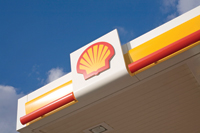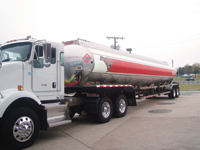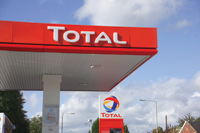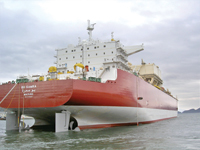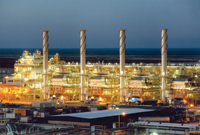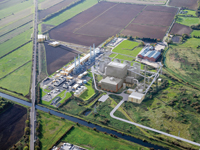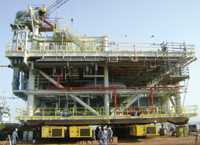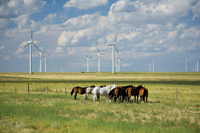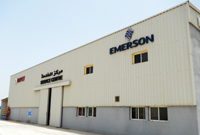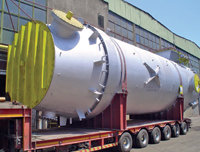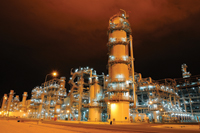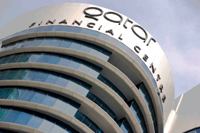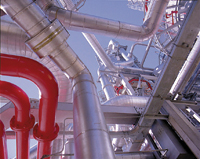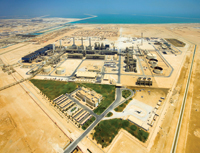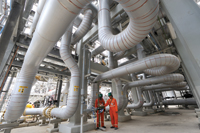
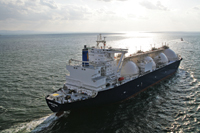 Yamal LNG ... offering tremendous scope
Yamal LNG ... offering tremendous scope
QATAR Petroleum is interested in securing a stake in the Yamal LNG project in the Arctic as well as a stake in independent Russian gas producer Novatek, a move that would match the world’s leading LNG exporter with the world’s unchallenged natural gas power.
“Qatar is interested in being a partner in the Yamal project and not only did we show our interest but we have already been engaged in the process and we created a team through Qatar Petroleum International to be fully engaged in the negotiation of partnership in Yamal LNG,” says Qatar’s oil minister Mohammed Al Sada.
It was the first confirmation by Qatar that it was seriously considering the proposal to join the Yamal LNG consortium of Novatek and France’s Total.
“We are working very hard and the partners have allowed enough resources,” he says. “All partners, from what I gather, specially I can talk about Qatar, are interested in concluding the deal as soon as possible.”
Total and Novatek signed two memoranda of cooperation in October that would give Total a 12.08 per cent stake in Novatek and a 20 per cent stake in Novatek’s Yamal LNG project, a 15 million tonnes per year (mtpy) plant to be built on the Yamal Peninsula in northwestern Siberia.
“We are interested in both, in Yamal as well as in Novatek, and we are engaged in the discussions on these two projects at the same time,” Al Sada said. Qatar is the world’s biggest LNG exporter with current production capacity of 77 mtpy.
Total and Novatek are seeking a new partner for the high-cost project and Russian energy minister Sergei Shmatko has been pressing the Russian case for Qatari participation in Doha in recent days.
He says Qatar could bring in its expertise in liquefaction technology, transport and marketing as well as finance for the project, which Novatek has estimated will cost $15-$20 billion. A final investment decision is due to be made at the end of 2012.
Al Sada was asked why Qatar, which produces LNG in a low-cost area with feedstock from the prolific North field, would be interested in investing in a high-cost project.
“Qatar is interested in investing outside Qatar and this is a project which is in line with our investment strategy and in line with our strengths and expertise,” he says.
Al Sada says Qatar, which has imposed a moratorium on further development of the 900 tcf North field, the biggest concentration of non-associated gas in the world, is looking to expand its presence abroad. “These are long-term projects and we look at this project through the life cycle of the project. We believe it is a good project,” he says.
He said that while QPI is studying a number of projects, it has no “geographic preference.” These include upstream exploration as well as petrochemicals and other projects in Asia and elsewhere.
“Right now we are focusing on these projects,” Al Sada says when asked if Qatar was looking to invest in other Russian energy projects.
“We have an excellent relationship with the Russian companies and we are open to look at any proposal be it in Russia or outside. We are very much open to the Russians and other companies, especially companies known to us such as Gazprom.
We are partners here in Qatar and we are interested in partnering with them outside as well.”
Novatek says it expected to choose more than one international partner for the Yamal LNG project by year-end, with the company keeping at least a 51 per cent stake. Other potential foreign partners named have included Shell, ExxonMobil, ConocoPhillips, Mitsui, Mitsubishi, Malaysia’s Petronas, India’s state-owned ONGC and Repsol of Spain.
A partnership between Qatar and Russia would bring together the world’s biggest LNG producer and the biggest producer of natural gas globally, though both countries are competing for a bigger share of the European market, where Russia is dominant through its pipeline gas sales, recently bolstered by the launch of the Nord Stream pipeline across the Baltic to Germany.
But Russia is now aspiring to become a major LNG player during the current decade from its Sakhalin 2 plant and Yamal once it is operational. This would put both Russia and Qatar in competition with Australia, which is set to become the second-biggest LNG producer after Qatar once its own massive liquefaction plants are completed.
“The reserves of gas in Yamal are the largest in the world,” Russia’s Shmatko says. “In five or six years, Russia will be a major actor in the LNG market” and would welcome bilateral and trilateral cooperation in its projects.
Al Sada says that Qatar is studying Yamal’s marketing strategy as part of its appraisal of the project. Some analysts have said they believe Yamal LNG’s market is more likely to be southern Europe rather than the Asian market given its location above the Arctic Circle.
Qatar already supplies LNG to Europe through its Adriatic terminal and the UK’s South Hook and has been seeking to increase its market share in Europe as exports to the US have fallen as a result of rising shale gas production there.
The Qatari minister at a news conference earlier did not respond specifically to remarks by Shmatko that Doha would cut its exports to Europe in the medium to long term. But he did say that Qatar had no intention of curbing its exports in the short term.
Al Sada says Qatar would export the gas “to where the market needs it. Today, the Asian market definitely has more potential for gas. In the future we will see some other areas that show more appetite for gas, South America for example.”










































































